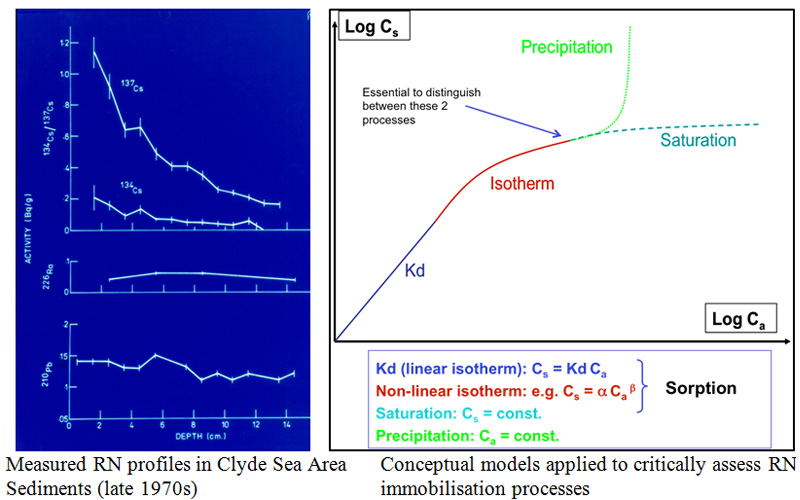Measurement and modelling of the distribution of natural and anthropogenic radionuclides in the environment; experimental study of radionuclide migration in the laboratory and in URLs.


BACKGROUND
Radiochemistry is an essential component of projects involving assessing and remediating radioactive contamination, developing concepts and technology for the management of radioactive waste and assessing the operational and post-closure safety of waste repositories.
Members of the team have been involved continuously in such work since 1975, including measurement of natural radionuclide concentrations in marine and terrestrial systems, laboratory studies of sorption, in-situ studies of migration, development and testing of thermodynamic / transport models and their associated databases and communicating radiation risks to technical and lay audiences.
EXPERIENCE
Radiochemistry is a key area of expertise, covered in an extremely wide range of studies carried out since 1975. These include work in conventional laboratories, contaminated marine and terrestrial systems, and underground research facilities, together with model development and model/database testing via natural analogues. A special, focus has been determining constraints on radionuclide mobility set by processes such as sorption and precipitation / co-precipitation, and capturing these in transport models. This has been put in context within integrated safety cases for disposal of a range of different types of radioactive wastes, for which the team has supported production and / or review since Project Gewähr (1985) – most recently for the NUMO Safety Case (2021).
Relevant publications include:
- McKinley, I.G., Hardie, S.M.L. and Hamamoto, T. (2017). Environmental radiochemistry: applicability and limitations of chemical thermodynamic models, APSORC 2017, Jeju island, South Korea, September 17th - 22nd.
- Ishida, K., Shibutani, S., Inagaki, M., Ishiguro, K., Umeki, H. and McKinley, I.G. (2015). Challenges for the next generation of radionuclide transport models. Proceedings of Global 2015, September 20-24, 2015 – Paris, France.
- McKinley I.G., Hardie S.M.L. and Klein E. (2014). Fukushima Dai-ichi Challenges from a radiochemistry perspective. INSJ International Nuclear Safety Journal, vol 3, issue 3, 68-74.
- Alexander W.R., Smith P.A. and McKinley I.G. (2003). Modelling radionuclide transport in the geological environment: a case study from the field of radioactive waste disposal. In Scott, E.M. (ed.), Modelling radioactivity in the environment, Elsevier, pp. 109-145.
- Smith P.A., Alexander W.R., Kickmaier W., Ota K., Frieg B. and McKinley I.G. (2001). Development and testing of radionuclide transport models for fractured rock: Examples from the Nagra / JNC Radionuclide Migration Programme in the Grimsel test site, Switzerland, J. Contaminant Hydrol. 47, 335-348. [Also in Japanese in JNC technical review 11, JNC TN 1340 2001-006].
- McKinley I.G., Alexander W.R., Gautschi A. and Waber N. (1998). An approach to validation of solubility databases for performance assessment. Radiochim. Acta, 82, 407-412.
- McKinley I.G. (1982). Prediction of radionuclide retardation during groundwater transport from laboratory sorption data. Proc. IAEA Symp. Migration in the terrestrial environment of long-lived radionuclides from the nuclear fuel cycle, pp. 147-152.
